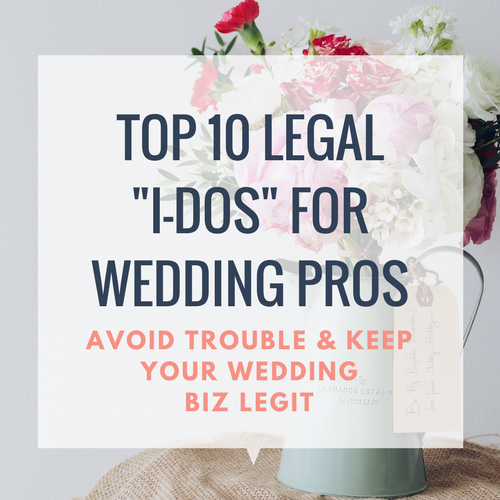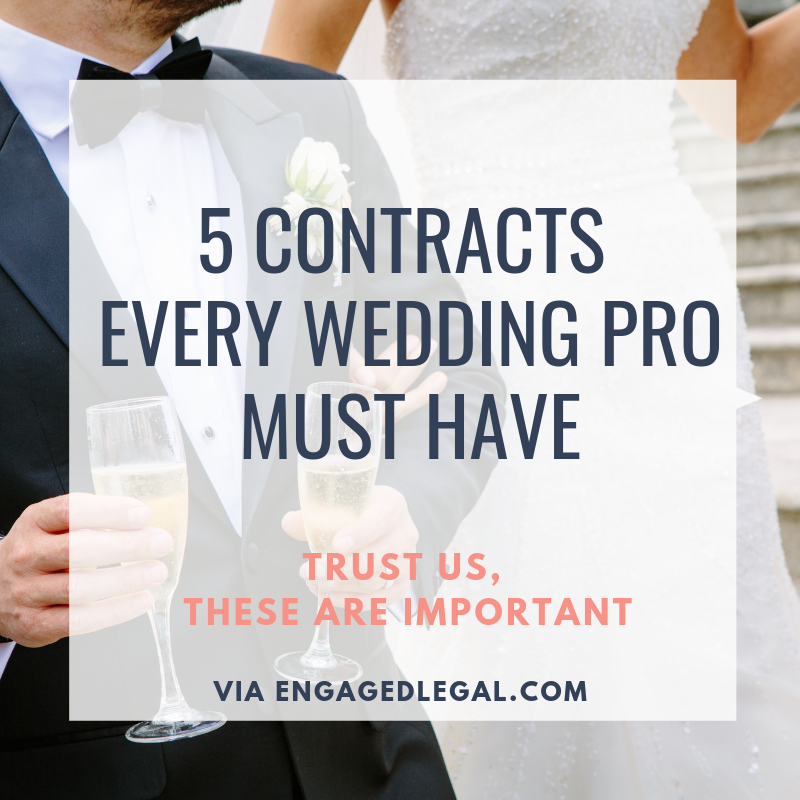Insurance for Event Venues & Wedding Venues
/If you’re opening a wedding venue or event venue, you’re making one of the largest investments in the industry. No other event or wedding pro is going to have to make such a large upfront investment— it’s just a completely different ballgame.
To ensure you protect your investment, you have to think more along the lines of traditional brick and mortar businesses. And what does that come with? Insurance.
Insurance, especially when paired with a limited liability entity like an LLC or Corporation, will help protect you financially if something should happen to your property (or to someone if they hurt themselves while at the property).
Here is a rundown of some of the types of insurance you should consider when evaluating your policies and carriers:
General Liability Insurance:
General liability insurance is a foundational component of insurance coverage for any business.
It offers broad protection against a range of liabilities arising from bodily injury, property damage, and personal injury claims. This coverage extends to incidents that occur on the venue's premises or as a result of its business operations.
For example, if a guest slips and falls on a wet floor during an event, general liability insurance would cover medical expenses, legal fees, and potential settlements associated with resulting lawsuits. It also typically provides coverage for damages caused by other accidents or incidents involving guests, vendors, or third parties.
Property Insurance:
Property insurance is essential for safeguarding the physical assets of a wedding venue, including buildings, equipment, furnishings, and décor.
This coverage typically protects against various risks such as fire, theft, vandalism, and natural disasters, ensuring that the venue can quickly recover from these unexpected inconveniences and continue operations.
Property insurance also provides coverage for repairing or replacing damaged “stuff” by covering the costs of materials, labor, and associated expenses.
NOTE: For this to work, it's crucial to accurately assess the value of the venue's property and obtain adequate coverage to protect the substantial investment made in establishing and maintaining the venue's facilities. It might mean a higher premium, but you would be covered in the event of an accidental fire, flood, theft, or other disaster.
Liquor Liability Insurance:
Liquor liability insurance is particularly critical for event venues that serve or sell alcohol.
This specialized coverage protects against claims related to alcohol-related incidents, such as accidents, injuries, or property damage caused by intoxicated guests. Liquor liability insurance covers legal defense costs, settlements, and judgments resulting from alcohol-related liabilities, including claims of negligence or overservice. This type of coverage is especially important in states with “Dram Shop Liability” (check your state to see if this applies).
Given the potential risks associated with alcohol service, it's essential for wedding venues to carefully evaluate their liquor liability exposure and obtain appropriate coverage tailored to their specific activities and operations.
Event Cancellation Insurance:
Wooooweeee. After COVID, we all know how important this one is.
Event cancellation insurance provides financial protection in the event of unforeseen circumstances that lead to the cancellation, postponement, or interruption of scheduled weddings or events (trigger flashbacks to March/ April 2020, yikes).
This coverage reimburses the venue for lost revenue, expenses incurred, and non-refundable deposits, helping to mitigate the financial impact of event cancellations on the business. Common covered perils include severe dangerous weather, illness or injury, vendor no-shows, and other unexpected emergencies.
Venues may ask clients to name them as “additional insured” in these policies.
Workers' Compensation Insurance:
Betcha didn’t think about this one right away, did you?
Workers' compensation insurance is required by most states’ laws for event venues with employees, providing coverage for medical expenses, lost wages, and disability benefits in the event of work-related injuries or illnesses. In Virginia, for example, anyone with over 2 employees must have workers compensation insurance, with employees construed broadly to include “includes part-time, seasonal and temporary workers, minors, trainees, immigrants and working family members.”
Workers Comp coverage protects both employees and the business by ensuring that injured workers receive necessary medical care and financial support.
Workers' compensation insurance also helps mitigate the risk of costly lawsuits or penalties for non-compliance with workers' compensation laws.
Professional Liability Insurance (Errors and Omissions Insurance):
Professional liability insurance, also known as errors and omissions (E&O) insurance, is important for “inclusive” event venues that provide professional services, such as event planning, coordination, or catering services.
This coverage protects against claims alleging negligence, errors, or omissions in the delivery of professional services, ensuring that the venue is adequately protected against potential lawsuits or financial losses. Professional liability insurance covers legal defense costs, settlements, and judgments arising from claims of professional misconduct or failure to meet contractual obligations. It's essential for venues to have comprehensive professional liability coverage tailored to their specific services and operations.
Cyber Liability Insurance:
This is a new one for the list.
In today's digital landscape, cyber liability insurance is increasingly important for wedding venues that collect and store sensitive information, such as client personal information, payment details, and vendor contracts. With the plethora of state laws patchworking the US, you don’t know whose laws might apply to your use of client names, emails, or payment methods.
Cyber Liability coverage provides protection against expenses related to data breaches, cyber attacks, and privacy violations, including notification costs, credit monitoring services, and legal fees associated with data breach response and liability claims.
Cyber liability insurance helps mitigate the financial and reputational risks of cyber incidents, safeguarding the venue's operations and protecting client confidentiality. Wedding venues must prioritize cybersecurity measures and obtain appropriate cyber liability coverage to mitigate the growing threat of cyber attacks and data breaches.
If you’ve got an email list, this is very important to obtain!
Did I miss anything?



















